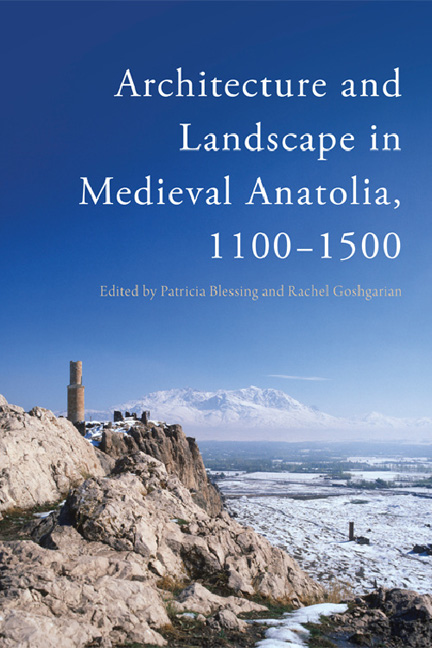Book contents
- Frontmatter
- Contents
- List of Illustrations and Tables
- Acknowledgements
- Foreword
- Map
- 1 Introduction – Space and Place: Applications to Medieval Anatolia
- Part I Building: Masons and Infrastructure
- Part II Social Groups: Akhis and Futuwwa
- 4 Suggestions on the Social Meaning, Structure and Functions of Akhi Communities and their Hospices in Medieval Anatolia
- 5 Social Graces and Urban Spaces: Brotherhood and the Ambiguities of Masculinity and Religious Practice in Late Medieval Anatolia
- Part III Exchange: Islamic and Christian Architecture
- Part IV Frameworks: Language, Geography and Identity
- Notes on Contributors
- Bibliography
- Index
4 - Suggestions on the Social Meaning, Structure and Functions of Akhi Communities and their Hospices in Medieval Anatolia
from Part II - Social Groups: Akhis and Futuwwa
Published online by Cambridge University Press: 03 January 2018
- Frontmatter
- Contents
- List of Illustrations and Tables
- Acknowledgements
- Foreword
- Map
- 1 Introduction – Space and Place: Applications to Medieval Anatolia
- Part I Building: Masons and Infrastructure
- Part II Social Groups: Akhis and Futuwwa
- 4 Suggestions on the Social Meaning, Structure and Functions of Akhi Communities and their Hospices in Medieval Anatolia
- 5 Social Graces and Urban Spaces: Brotherhood and the Ambiguities of Masculinity and Religious Practice in Late Medieval Anatolia
- Part III Exchange: Islamic and Christian Architecture
- Part IV Frameworks: Language, Geography and Identity
- Notes on Contributors
- Bibliography
- Index
Summary
The Islamic tradition of futuwwa (Turk. futuvvet), or ethical codes, received a certain degree of political legitimacy when the Abbasid caliph al-Nasir li-Din Allah (r. 1180–1225) admitted it to courtly life. Soon after, the caliph formally invited the Anatolian Seljuk sultan Izz al-Din Kay Kawus (r. 1211–20) to his futuwwa by sending him a prestigious emissary and gifts imbued with futuwwa symbolism. In time, the akhi brotherhoods of Anatolia adopted and popularised futuwwa teachings during a period of political fragmentation in the region. In fact, in the post-Mongol period, akhis rose to political prominence in many urban centres. Aside from their ethical teachings and political actions, akhi brotherhoods left their mark by erecting hospices (zawiyas), where members of mystic orders conducted communal gatherings and hosted guests. This chapter will look into the possibility of distinguishing akhi communities of medieval Anatolia from the larger category of Sufis by examining the ways in which hospices built by these communities had particular social meanings and functions. More specifically, this chapter proposes that studying the locations of akhi hospices may allow us to further understand how akhi communities functioned in the late medieval period. As they were concentrated in towns along trade routes, akhi hospices might have had significant ties to the economy of this region. Relevant narrative sources buttress this supposition, especially futuwwa manuals that underline akhi teachings, such as their focus on professional crafts and the marketplace, and that might shed further light upon them in the broader context of medieval Anatolia. As per the difficulties with distinguishing Sufi and akhi buildings and the limited scope of this study, an art historical and architectural analysis beyond that offered by recent studies is not attempted here.
Historiography: Akhis, Dervishes and the Economy
Although akhi brotherhoods have attracted the attention of many scholars, much of the literature on akhis is problematic. Some of the difficulties with studying akhis seem to relate to the sources and the way they are utilised by scholars. Some studies exclude crucial primary sources, often because of the philological skills necessary to interpret them. On the other hand, omitting source material in Arabic also stands out as an ideological concern with detaching Anatolian akhis from the Arabic-futuwwa tradition for the purpose of underlining their ‘Turkishness’.
- Type
- Chapter
- Information
- Architecture and Landscape in Medieval Anatolia, 1100-1500 , pp. 95 - 113Publisher: Edinburgh University PressPrint publication year: 2017



